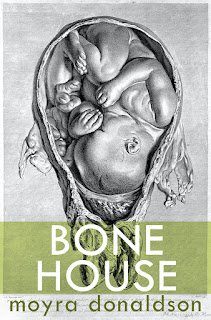Bone House (Doire Press 2021) is the latest collection from Moyra Donaldson. She has published eight collections of poetry, including a Selected Poems and most recently, Carnivorous from Doire Press. Her awards include the Women’s National Poetry Competition, The Allingham Award, Cúirt New Writing Award, North West Words Poetry Award and the Belfast Year of the Writer Award. She has received five awards from the ACNI, including the Major Artist Award in 2019. Her poems have featured on BBC Radio and television, as well as on American national radio and television. She has read at festivals in Europe, Canada and America. Moyra has been involved in an array of other projects, including a collaboration with photographic artist Victoria J Dean, resulting in an exhibition and the publication Abridged 0 -36 Dis-Ease. Blood Horses, a collaboration with Wexford artist Paddy Lennon, culminated in a limited-edition publication of artworks and poems. She has also worked with Big Telly Theatre Company on a number of projects.
This is a brave, courageous book that does not compromise, as the opening poem says of the 'good glasses' So What if We Break Them. A beautiful, carefully wrought, cohesive collection, it is certainly a work of art, one you can dip in and out of, read from cover to cover in a single sitting, and one you can come back to time and again. There is so much to admire in Bone House, economical, classical, adventurous, and with a finger on the pulse. It has a daring spirit that sprints forward like the horses in Samhain, while falling back, masking an intellect and compassion that is never gaudy.
Mother as a figure, and motherhood feature strongly in the compilation. She is a mercurial character, literally in Mother was the Weather when 'hearts became barometers'. In the Movie of Her Life, which is the title of two poems, the mother's past is explored, the freedom she could have tasted before children and marriage, before succumbing to her father's expectation. In the duplicate title Donaldson again inspects 'My mother before she was my mother'.
Unusual is the fact that the collection has four title poems (which could be read as one I suppose). In its first iteration mother gets no rest 'parading through the night/eternal like the moon.' The second places the poet as mother, and eternity here is in the 'milky breath' of her own daughter. In the third, poet comes face to face with the moon, 'I see the moon/and the moon sees me'. In the final phase Donaldson confronts mortality, 'is the girl already dead I loved'. This girl could be Alice in Wonderland of Untitled 'walking the roads/fearing what I might find; which one of us is missing?'
I particularly loved Beltane in the Time of Virus when Donaldson compares the topsy-turviness of COVID days to 'like being a teenager again, sitting out in the garden...thinking what the fuck'. Here there is gorgeous sensuality in 'the breeze finding its way beneath my robe and over/my body like a lover'. My First 10 Months as a Monk addresses the times too, in such a stylish way, juxtaposing the acedia of a monk's life with the monotony of the isolation we all felt 'In this year of blur/hours'.
Hecuba in the Bowtown Estate is a teriffic poem about rage, 'I am the bitch-mother that howls outside your window'. Donaldson as matriarch fears for her own daughter's life in Daughter Competing on Her Horse. While in Daughters Who Dance with Death she relates to Amy Winehouse's mother who said 'Each time I saw her I thought it would be the last.' This angst is beautifully reflected in the succeeding poem, The Adoration of the Shepherds with a Lamp, where Rembrandt portrays Mary cloaking her son, and in another painting by the artist the foreseen woe manifests, which the poet calls 'the dark night over Golgotha.'
The cover art of the collection depicts a foetus in utero and Anatomy of the Gravid Womb - William Hunter addresses the legacy of the physician who dissected the bodies of women who died not having reached full term pregnancy. It leaves one queasy to think of this 'Foetus whole and intact: mother butchered.' In an article I found online Camilla Rostvik writes 'It is a reminder of the long patriarchal past of obstetrics.' God of the patriarchy is of the Old Testament in None Righteous and Rock of Ages. Tiresias, the ancient Greek prophet who spent seven years as a woman, leaves the reader dumbfounded by the sole interest of the old gods in 'whether the sex was better or worse.'
I adore this publication for Prayer to Black, Give Yourself Peace and Crone Song. This is an outstanding production and it is probably not fair for me to say anymore, except advise you get a copy to read. It is a master class on how a collection could be written, the composition of a maestro. Bone House is dedicated to Donaldson's granddaughter, Daisy. It contains an introduction by Paula Meehan. Like the sound of the 'singing bowl' struck like a gong in the final poem, Hearing, the artistry of these verse will continue to ring through my consciousness.
Available here.




No comments:
Post a Comment